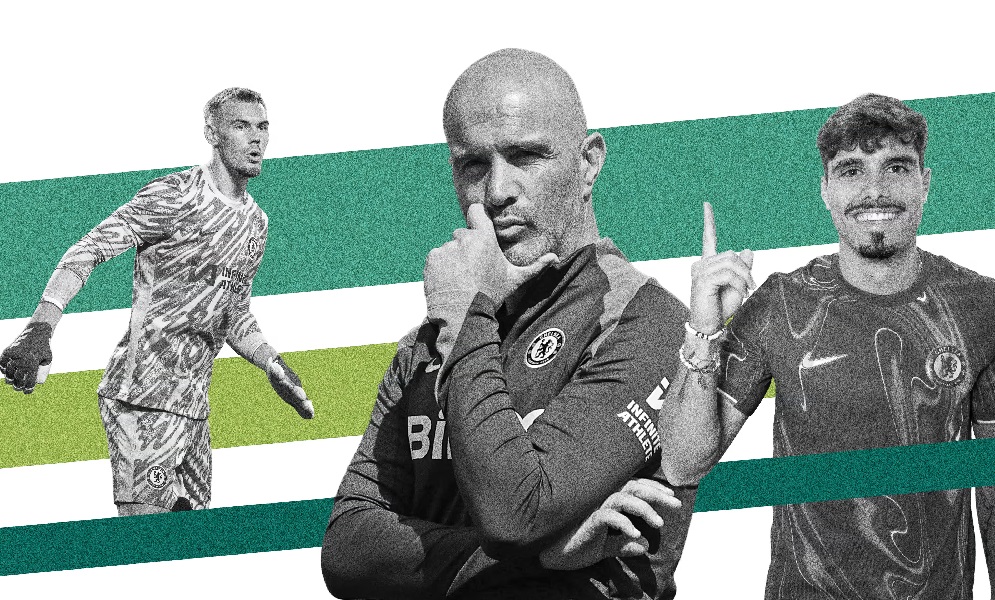re-season is always about the performance and never about the results. And even then there has to be an awareness of what managers are looking for from each individual game: clubs can be at different stages of their physical development, or managers may be working on a specific ploy. They are means to an end. Nobody should ever read too much into pre-season. And yet, all that said, it’s impossible not to look at Chelsea’s pre-season games without a slight twinge of concern.
Enzo Maresca’s record as Chelsea manager at this stage reads: played six, won one. That win came against the Mexican champions Club América who, four games in to the new Mexican season, sit in ninth place. Chelsea have also played the champions of England, Spain, Scotland and Italy in their warm-up matches, plus Wrexham, who were promoted from League Two last season. That’s a challenging run of games. Against Manchester City they were 2-0 down inside five minutes, the result of a soft penalty and a wayward backpass. The 4-2 defeat perhaps wasn’t reflective of the pattern of the game. Mitigation can be found.
But it’s not just results. There’s also a pervading sense of chaos. After the initial splurge following the Clearlake takeover, the £1bn spent on 28 senior players, this was supposed to be when the consolidation began. They had signed young players, we were told, so that there would be less need for upheaval as the project progressed. Players would grow into stature at the club. And then this summer a further nine players arrived at a cost of £160m, with two more already in the pipeline for next season.
An attempt to land the highly rated 20-year-old forward Samu Omorodion from Atlético fell through when a contract couldn’t be agreed, leading to talks over a potential move for João Félix. This feels like the behaviour of an addict, desperately chasing the endorphin high of a purchase: if one Atlético forward won’t come, why not go for another one, even if he has an entirely different profile?
Talks are apparently ongoing to land Victor Osimhen from Napoli, which would probably mean Romelu Lukaku – still, remarkably a Chelsea player – moving in the other direction. Lukaku has now spent six seasons on Chelsea’s books in two stints, during which time he has played 159 league games, only 36 of them for Chelsea as he has been loaned out to West Brom, Everton, Internazionale and Roma.
The big signing of this summer has been Pedro Neto, bought from Wolves for £51m. He’s 24 and clearly gifted, a relentless worrier of full-backs, even if there must be some concern about his goals return. He’s the sort of signing that would have felt entirely natural for the pre-Clearlake Chelsea. But what does his arrival mean for the fleet of wide forwards already at the club? Is that an admission that Raheem Sterling, Mykhailo Mudryk and Noni Madueke aren’t quite where Chelsea would like them to be?
Filip Jørgenson has become the seventh goalkeeper on their books. Omari Kellyman adds to the legions of players who can play off a frontman. Like a bride fretting about the wedding venue, they’ve swapped Lewis Hall for Kiernan Dewsbury-Hall. If there is a pattern there, it is only investment in youth, presumably with a view to trading further down the line. And trading will be essential to cope with profit and sustainability regulations. Amortisation with long contracts is a neat accountancy trick to allow spending in the short term, but bills must be paid at some point.
That’s why Hall, Omari Hutchinson and Ian Maatsen have been sold for a combined £86m, with sales of Conor Gallagher, who is close to a switch to Atlético, and Trevoh Chalobah, who has been linked to Crystal Palace and Aston Villa, likely to take that figure to around £150m. All five of those players are academy products and therefore represent pure profit; there is no amortised fee to be taken into account. Still, selling two hotels between different arms of the business suggests PSR remains a concern; and soon there’ll be no academy products left to sell.
It’s easy to forget that Chelsea were actually pretty good after Christmas last season, surging to Europa League qualification and reaching the final of the League Cup. But then Mauricio Pochettino left by mutual consent, usually a euphemism, but he didn’t seem to be too disappointed to be departing the chaos, which now includes a £100m-plus midfielder, Enzo Fernández engaging in racist and homophobic chanting as he celebrated winning the Copa América.
There are positives for Maresca: Cole Palmer excelled last season; Malo Gusto looked highly promising; Marc Cucurella, after a poor start, blossomed and had a golden Euros. Christopher Nkunku is seemingly fit after injury problems last season. There are good players at Chelsea, lots of them; the question is whether, amid the constant noise, any manager will ever be able to find a pattern for them to play in.
The great disruptors have disrupted, but at some point the disruption has to stop.








More Stories
Amorim insists Fernandes not leaving Manchester United amid Madrid reports
How debt burden pushed Nigerian boxer Segun Olanrewaju to a fight that took his life
Nigeria Taekwondo Federation boss, Abdullahi Saidu dies at 53